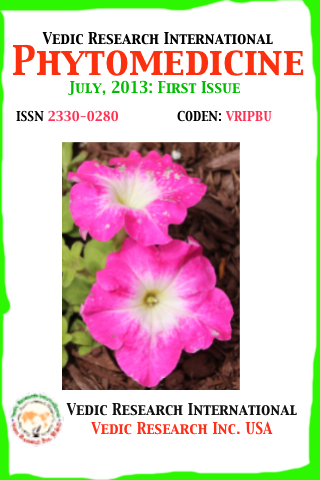
Evaluation of Antiulcer Activity of Picrasma Quassioides Bennett Aqueous Extract in Rodents
Abstract
The present study was focused to evaluate the protective activity of the Picrasma quassioides (PQ) whole plant aqueous extract against aspirin-pylorus ligation, HCl-ethanol and water immersion stress induced ulcers. In the present study aspirin-pylorus ligation induced gastric ulcer was adopted to screen the antisecretory activity of plant extract. PQ extract produced 64.63% ulcer inhibition at 400mg/kg body weight, when compared to that of standard (ranitidine, 50mg/kg) which produced 68.52% ulcer inhibition. In HCl-ethanol induced ulcer model 400mg/kg body weight of PQ produced 72.24% ulcer inhibition when compared that of standard (sucralfate, 100mg/kg) which produced 75.01% ulcer inhibition. In water immersion-stress induced ulcer model 400mg/kg body weight of PQ, produced 84.11% ulcer inhibition when compared to that of standard (omeprazole, 20mg/kg) which produced 82.17% ulcer inhibition. PQ showed significant percentage of ulcer inhibition in the three models tested. The glycosides which are present in the aqueous extract could be responsible for their antiulcer properties.
Keywords
Full Text:
PDFReferences
Sampson JH, Phillipson J D, Bowery N G, O'Neill M J, Houston JG, Lewis J A. (2000). Ethno medicinally selected Plants as Sources of Potential Analgesic Compounds: Indication of in-vitro Biological Activity in Receptor Binding Assays. Phytother. Res. 14: 24–29.
http://dx.doi.org/10.1002/(SICI)1099-1573(200002)14:1<24::AID-PTR537>3.0.CO;2-9
Goel RK, Bhattacharya SK. Gastro-duodenal mucosal defense and mucosal protective agents. Indian Journal of Experimental Biology 1991, 29; 701-714.
PMid:1769712
Hayes PC, Simpson KJ, Garden OJ. Liver and biliary tract diease. In: Davidson's Principle and Practice of Medicine, 19th ed, India; Churchill Livingstone 2002: 831-888.
Flora of Pakistan: Picrasma quassioides. http://www.efloras.org/florataxon.aspx?flora_id=5&taxon_id=200012490.
http://www.naturalmedicinalherbs.net/herbs/p/picrasma-quassioides=nigaki.php
Jiang MX, Zhou YJ. Canthin-6-one alkaloids from Picrasma quassioides and their cytotoxic activity. J Asian Nat Prod Res. 2008 Nov-Dec;10(11-12):1009-12.].
http://dx.doi.org/10.1080/10286020802277956
PMid:19031238
Jiao WH, Gao H, Li CY, Zhou GX, Kitanaka S, Ohmura A, Yao XS. Beta-carboline alkaloids from the stems of Picrasma quassioides. Magn Reson Chem. 2010 Jun;48(6):490-5.
PMid:20474029
Jiao WH, Gao H, Zhao F, Lin HW, Pan YM, Zhou GX, Yao XS. Anti-inflammatory alkaloids from the stems of Picrasma quassioides BENNET. Chem Pharm Bull (Tokyo). 2011;59(3):359-64.
http://dx.doi.org/10.1248/cpb.59.359
Cordell GA (1978) Anticancer agents from plants. In: Reinhold L, Harborne JB, Swain T (eds) Progress in biochemistry, vol 5. Pergamon Press, Oxford New York, pp 273–316.
Allan EJ, Scragg AH, Pugh K (1988) Cell suspension culture of Picrasma quassioides: the development of a rapidly growing, shear resistant cell line capable of quassin formation. J Plant Physiol 132:176–183.
http://dx.doi.org/10.1016/S0176-1617(88)80157-3
Khandelwal KR. Practical pharmacognosy: Techniques and Experiments. 8th ed, Nirali Prakashan, Pune, India, 2001, 149-156.
Kokate C.K., Purohit A.P., Gokhale S.B. Pharmacognosy. 15th ed, Nirali Prakashan, Pune, India, 2002.
Evans W.C. Trease and Evans Pharmacognosy. 15th ed, Elsevier, New Delhi, India, 2006.
Turner RA. Screening Methods in Pharmacology. Academic Press, Newyork, USA, 1965, 22-41.
PMid:14312384
Shay H, Komarov SA, Fels SE, Meraze D, Gruenstein M, Siplet H. A simple method for the uniform production of gastric ulceration. Gastroenterology. 1945;5:43–61.
Ganguly AK, Bhatnagar OP. Effect of bilateral adrenalatomy on production of restraint ulcers in the stomach of albino rats. Can J Physiol Pharmacol. 1973;51:748–50.
http://dx.doi.org/10.1139/y73-113
Kulkarni SK. Handbook of Experimental Pharmacology. 3rd ed. New Delhi: Vallabh Prakashan; 1999. pp. 148–50.
Yesilada E, Gurbutz I, Ergun E. Effect of Cistus laurifolius L. flowers on gastric and duodenal lesions. J Ethnopharmacol. 1997;55:201–11.
http://dx.doi.org/10.1016/S0378-8741(96)01502-4
Dharmani P, Mishra PK, Maurya R, Chauhan VS and Palit G. Allolypus serratus : a plant with potential antiulcerogenic activity. Journal of ethnopharmacology,99,361-366.
http://dx.doi.org/10.1016/j.jep.2005.01.011
PMid:15878649
Alder R. In Breakdown in human adaptation to stress. Boston: Martinus Ninjihoff; 1984. p. 653.
Alphine RS, Word JW. Antihistaminic activity and ulceration. Eur J Pharmacol. 1969;6:61–6.
http://dx.doi.org/10.1016/0014-2999(69)90066-1
Kaunitz JD, Akiba Y. Gastroduodenal mucosal defense: Role of endogenous mediators. Curr Opin Gastroenterol 2004;20:526-32
http://dx.doi.org/10.1097/00001574-200411000-00004
Kochman ML, Elta GH. Gastric ulcers - when is enough, enough. Gastroenterology 1993;105:1583
http://dx.doi.org/10.1016/0016-5085(93)90177-E
Chan FK, Leung WK. Peptic ulcer disease. Lancet 2002;360:933-41
http://dx.doi.org/10.1016/S0140-6736(02)11030-0
Cola Miranda M, Barbastefano V, Hiruma-Lima CA, Calvo TR, Vilegas W, Brito AR. Antiulcerogenic activity of indigofera truxillensis kunth. Biota Neotrop 2006;6:3
http://dx.doi.org/10.1590/S1676-06032006000300004
Sannomiya M, Fonseca VB, Dasilva MA, Rocha LR, Dossantos LC, Hiruma-Lima CA, et al. Flavonoids and antiulcerogenic activity from Brysonima crassa leaves extracts. J Ethnopharmacol 2005;97:1-6
http://dx.doi.org/10.1016/j.jep.2004.09.053
PMid:15652267
Umamaheshwari M, Asokkumar K, Rathidevi R, Sivashanmugam AT, Subhadra DV, Ravi TK. Antiulcer and in vitro antioxidant activities of Jasminum grandiflorum L. J Ethnopharmacol 2007;110:464-70
http://dx.doi.org/10.1016/j.jep.2006.10.017
PMid:17125945
Narayan S, Devi RS, Jainu M, Sabitha KE, Shyamala DC. Protective effect of a polyherbal drug ambrex in ethanol induced gastric mucosal lesions in experimental rats. Indian J Pharmacol 2003;36:34-7.
Ologundudu A, Lawal AO. The antiulcerogenic activity of aqueous extract of Carica papaya fruits on aspirin induced ulcer in rats. Int J Toxicol 2008;5:2.
Shay H, Komarov SA, Fele SS, Meranze D, Gruenstein H, Siplet H. A simple method for uniform production of gastric ulceration in rat. Gastroenterology 1945;5:43-61
Soll AH. Pathogenesis of peptic ulcers and implication for therapy. N Engl J Med 1990;322:909-16.
http://dx.doi.org/10.1056/NEJM199003293221307
PMid:2179722
Surendra S. Evaluation of gastric anti-ulcer activity of fixed oil of tulsi and possible mechanism. Indian J Exp Biol 1999;36:253-7
Peters MN, Richardson CT. Stressful life events, acid hyper secretion and ulcer disease. Gastroenterology 1983;84:114-9.
PMid:6847839
Brodie DA, Hanson HM. A study of the factors involved in the production of gastric ulcers by the restraint technique. Gastroenterology 1960;38:353-60.
PMid:13804627
DOI: http://dx.doi.org/10.14259%2Fpm.v1i1.35
Refbacks
- There are currently no refbacks.






